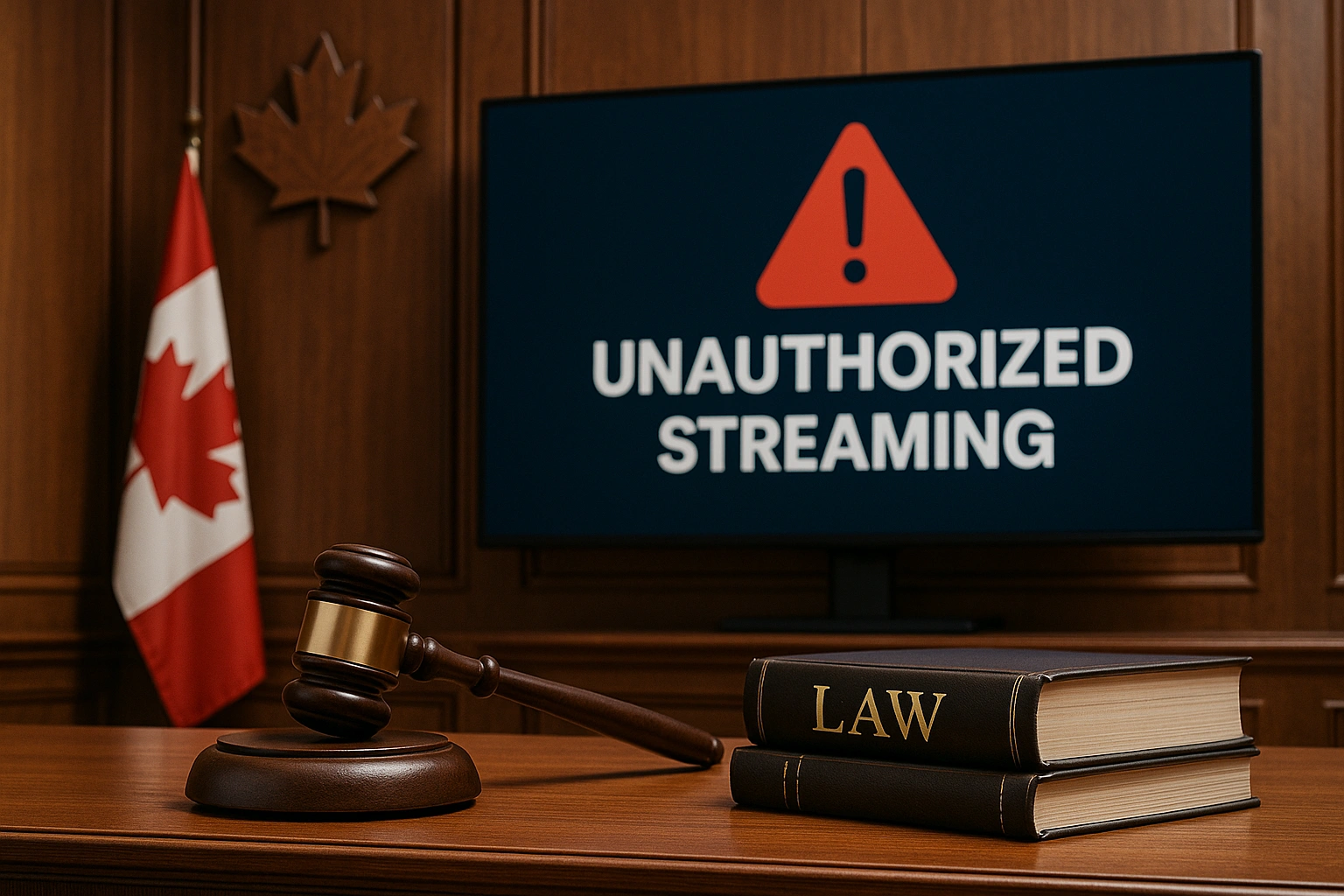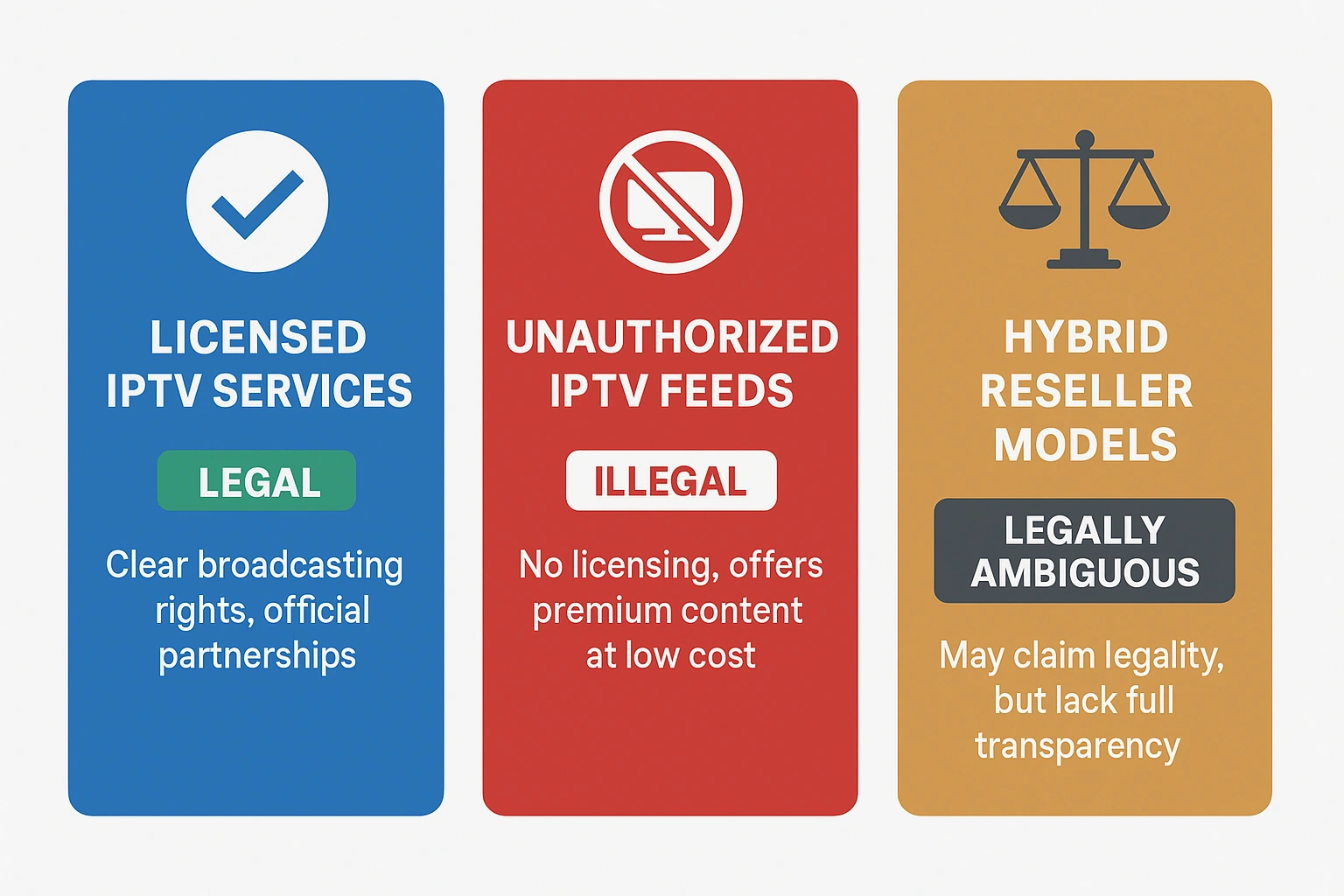
IPTV, or Internet Protocol Television, refers to the delivery of television content over the internet. While the technology itself is widely used by major telecom companies to deliver their own TV services, questions often arise around IPTV Canada legality, particularly when providers distribute channels or content without proper authorization from copyright holders. IPTV differs from traditional broadcast methods like cable or satellite by using an internet connection to stream content directly to your device.
Not all IPTV services operate under the same legal standards. While some are fully licensed to broadcast specific content, others aggregate content from multiple unauthorized sources without agreements with original content owners.
The legality of IPTV services varies widely, with some providers operating fully within the law and others distributing unauthorized content.
| IPTV Category | Legality | Common Characteristics |
|---|---|---|
| Licensed IPTV Services | Legal | Clear broadcasting rights, official partnerships |
| Unauthorized IPTV Feeds | Illegal | No licensing, offers premium content at low cost |
| Hybrid Reseller Models | Legally ambiguous | May claim legality, but lack full transparency |
This “grey zone” confuses many users who assume that paying for a subscription automatically makes the service legitimate.

Canada has robust laws to protect intellectual property. While IPTV isn’t mentioned explicitly in any legislation, several acts cover the distribution and consumption of digital content.
This law governs the reproduction and distribution of copyrighted works. Streaming or redistributing TV shows, sports events, or films without the creator’s permission is a violation.
Under this law:
Providers that distribute content without licenses are infringing.
Consumers streaming such content can also face penalties, especially if done knowingly.
This legislation pertains to unauthorized broadcasting of content. Although originally crafted for radio and satellite signals, it also applies to internet-based distribution when unauthorized channels are rebroadcast.
Violators can face seizure of equipment, fines, or even criminal charges.
The Canadian Radio-television and Telecommunications Commission (CRTC) regulates media distribution. Only entities with proper licensing and regulatory compliance can legally distribute content.
While laws offer a foundation, court cases bring clarity. Several notable actions in recent years have set important precedents for IPTV legality in Canada:
Federal Court Injunctions: Courts have granted telecom companies the ability to block unauthorized IPTV domains and platforms that were found to distribute pirated content.
Takedown Actions: Websites offering illegal streams have been dismantled under court order, sometimes involving cooperation with international agencies.
These actions demonstrate that authorities are actively enforcing existing laws. Consumers should take this into account when evaluating a provider.
A key question many people ask is: “Is IPTV legal in Canada?” The answer depends on the provider’s compliance with applicable IPTV laws and whether content is properly licensed.
Canadian law tends to differentiate between casual viewers and those facilitating distribution. That said, streaming unauthorized content—even passively—could be considered infringement under certain interpretations of the law.
Legal experts note that enforcement typically targets large-scale operations. However, consumers have reported receiving warnings or notices from their internet service providers when accessing illegal streams.
Streaming is generally considered less risky than downloading, as it doesn’t result in permanent copies of copyrighted material being stored. Still, that doesn’t make it risk-free.
The safest route for viewers is to use services that clearly state they have content licenses and operate within the legal framework.
Given the legal ambiguity surrounding many services, it’s important to evaluate providers critically. Not all who claim to be compliant actually are.
When searching among various Canadian IPTV providers, look for those with transparent licensing and clear terms of service to ensure compliance with copyright regulations.
Transparent Ownership: The company clearly lists contact information, business registration, and terms of service.
Partnerships with Content Owners: Services have licensing agreements with broadcasters, studios, or networks.
Reasonable Pricing Models: Legal content comes at a cost; offerings that seem too cheap should raise suspicion.
Availability on Official App Stores: Legitimate providers typically distribute apps via Google Play or the Apple Store.
Vague or hidden contact details
Claims of thousands of premium channels at ultra-low cost
Requirements to sideload apps from unofficial websites
No mention of content rights or licensing
Many IPTV services operating in Canada are actually resellers of larger, foreign-based IPTV platforms. These services often present themselves as Canadian, but they simply rebrand and redistribute feeds obtained from unauthorized sources.
This reseller model adds another layer of legal vulnerability:
The original service may be illegal.
The reseller adds a margin and markets it locally.
Consumers are misled into believing they are buying a fully compliant service.
Using such services might not just be legally questionable—it could also expose users to security risks, such as data collection or payment fraud.

If you’re looking for legal ways to enjoy internet-based television, ROXTV provides fully legal IPTV access by operating within the boundaries of Canadian broadcasting and copyright regulations. Our platform is built around clear content policies, verified distribution rights, and a customer-first approach that prioritizes reliability and transparency. Explore our subscription plans today and start streaming legally with ROXTV.
| Option | Description |
|---|---|
| ROXTV | Canadian IPTV provider committed to legal access and content transparency. |
| Licensed IPTV Services | Services that follow broadcasting regulations with verified content. |
| Verified Live TV Apps | Apps from known networks offering licensed, authorized live streams. |
While these options may come at a higher cost compared to unverified alternatives, they ensure reliable service, legal security, and peace of mind.
The legal landscape around IPTV in Canada is evolving. Here are key trends to watch:
Increased Enforcement: As copyright owners become more vigilant, enforcement actions are expected to increase.
Domain Blocking: Canadian ISPs are now being ordered to block access to known illegal IPTV services.
VPN Limitations: While VPNs can mask activity, they don’t shield users from legal consequences if the source content is illegal.
Legislative Changes: Future updates to telecommunications and copyright laws may provide clearer definitions of streaming responsibilities.
The bottom line: Ignorance of the source doesn’t always protect the consumer. Understanding the chain of content rights is increasingly becoming the viewer’s responsibility.
Understanding IPTV legality also requires a look at how Canadian consumers are protected. IPTV customers have rights that are safeguarded under federal and provincial law, especially regarding digital services.
Right to clear disclosure: IPTV providers must offer transparent terms of service, including refund policies and billing practices.
Right to data privacy: Any provider operating in Canada must comply with laws such as PIPEDA (Personal Information Protection and Electronic Documents Act), ensuring personal data is handled responsibly.
Right to service reliability: While not legally enforced in all cases, consumers can report service issues to provincial consumer protection agencies or the CCTS (Commission for Complaints for Telecom-television Services).
Illegal or grey-area IPTV services often operate outside these protections. This means if your service fails, misuses your data, or disappears overnight, you may have no recourse. On the other hand, licensed and compliant providers like ROXTV offer both legal assurance and consumer accountability.
| Scenario | Legal Status | Explanation |
|---|---|---|
| Streaming from licensed Canadian services | Legal | Full compliance with Canadian laws |
| Using services with unclear licensing | Risky | Could involve unauthorized content distribution |
| Reselling IPTV subscriptions | Possibly illegal | If the original source lacks proper authorization |
| Installing apps from unknown sources | Risky | Often linked to unlicensed providers |
IPTV is reshaping how Canadians access entertainment—offering flexibility, lower costs, and convenience. But with this evolution comes legal complexity.
IPTV itself isn’t illegal. The issue lies in how content is sourced and delivered. Consumers can safely enjoy IPTV by choosing services that are licensed, transparent, and operate within Canadian regulations.
The key is awareness: verify licensing, avoid suspiciously cheap offers, and steer clear of services with unclear ownership or questionable app sources. Being informed protects both your viewing experience and your legal standing.
ROXTV remains committed to legal IPTV in Canada, offering peace of mind through verified content, transparency, and full compliance. If you’ve ever wondered, “Is IPTV legal in Canada?” — the answer is yes, when the provider follows the rules.
Get started with our premium IPTV service today and never miss your favorite shows again.